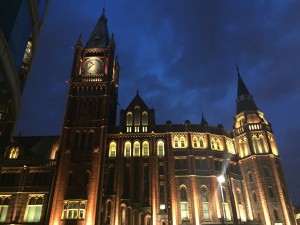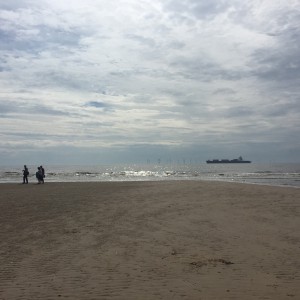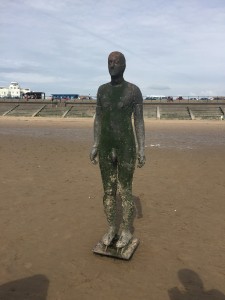As far as first major conferences go, I got lucky attending BLA 2015 in Liverpool. From the very beginning, meeting Samantha at Euston, where our direct train with seat bookings to Liverpool Lime Street had been cancelled and all the other trains were severely delayed, Samantha happened to be a seasoned traveler from Euston with an apt knowledge of Northern geography and steered us to the conference in time for lunch.
Entering a room full of people you’ve never met with the aim of chatting and building professional connections is never easy. I was grateful to already know Samantha and Suzanne as well as a former colleague who’s currently posted at Middlesex. It was also very useful that this year BLA implemented a buddy scheme, and I was paired with Information Specialist at Aston University and BLA conference veteran, Nicola Dennis. I was so grateful to have somebody with whom I could compare notes and who introduced me to several of the other conference delegates.
Also in the mix were the twenty sponsors. As I learned at this conference, my current challenge of learning our key financial databases is as good problem to have. Many of the other conference delegates dream of having access to the volume and range of e-resources we do at Cass. The vendors said they’d be happy to help me learn how to use them on a one-to-one basis, which was a relief.
This variety in databases is a reason why it’s so important to get our current students to learn about them. As Robert Farrell from City University of New York discussed in his Day 2 Keynote: ‘Indirect innovation: spotting and realizing your library’s hidden opportunities’, sometimes getting people on board for your idea means using many different outlets. For instance, in the process of securing more funding one could, over the course of years, befriend the spouse of the ambitious academic so they would talk about you and be more perceptive to your idea for a library-based sub-program which will fit in nicely to the grant-proposal they’re writing. (I’m sure he wasn’t speaking from experience). For me, it’s much simpler: I just need to get students’ peers and lecturers on board to talk about these fantastic resources we have available so they’re more likely to buy in when I speak to them in their lectures.
Being new and not knowing many people at the conference worked to my advantage in many ways. For instance, when conference delegates were asked to sign up for the seating arrangement at the gala dinner later in the evening at the Victoria Gallery Museum (pictured), each of the tables had at the top the name of the current BLA officers. I recognized the name of the friendly Scottish guy Samantha and I had just been talking to and wrote my name along with some others at his table. As it turned out, he was the chairman of the BLA, Keith Walker. He had some very useful advice for me about using Google as a starting point when talking to students about searching strategies on academic databases.

The lovely Victoria Gallery Museum, owned by University of Liverpool
Not least for the afternoon excursion to Crosby Beach so see ‘Another Place’ by Antony Gormley (pictured), I’m glad I was able to attend BLA 2015. To cap off this post and because everyone likes a list, here are the top 5 ways BLA was useful to me as a newcomer:
- Lots of practical and useful advice like:
• Indirectly reaching out to students through peers and lecturers
• Positioning learning assessments on VLEs within the academic modules
• How to use Google as a starting point for teaching search techniques on academic databases - Conversations with vendors. I spoke to big vendors like EBSCO host, Thomson Reuters, and ProQuest. I spoke to smaller ones like Oxford Business Group and GSE Research and Greenleaf publishing. I also spoke to a couple of American vendors like Mergent, Inc and the New York Times who are looking to break into the UK academic market. Many of the instruction manuals and catalogues I picked up have a lot of useful information a bout using their products. Please let me know if you’d like to have a gander.
- Conference papers. I particularly enjoyed Samantha and Suzanne’s winning paper about crowd sourcing digital literacy training on Moodle. Jack Hyland’s paper about using the VLE to deliver all of the digital literacy training to a high volume of students at Dublin City University was really interesting in the way gave us some possible solutions to our low uptake of the Cass Library Certification on Moodle, for instance by giving an explicit deadline for completion of the module. Emma Thompson’s paper on how at the University of Liverpool the library worked with the school to create a program to employ some of the Marketing students as consultants was incredibly innovative not only through the unique insight the library got into the students’ needs but also in that the students walked away even better informed about library services than they ever would have otherwise.
- Networking with other delegates. Like I said, this was a little daunting at first, but it turns out that Business Librarians as a whole are really friendly. Even when I drifted into my own familiar territory of Customer Service, talking about learning environments used to manage student behaviour, I expected to lose their interest, but on the contrary, the people I spoke to continued to be engaged in the conversation. Plus, I learned a lot about where to anticipate challenges over the next year, and what other Librarians have done to combat them.
- Freebies! It’s always great to have a start on the things we can give out to students at events.

Crosby Beach, to which we traveled using the Merseyside commuter rail line Northern Line.

Up close, one of the hundred statues, part of Antony Gormley’s ‘Another Place’.